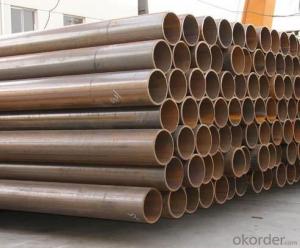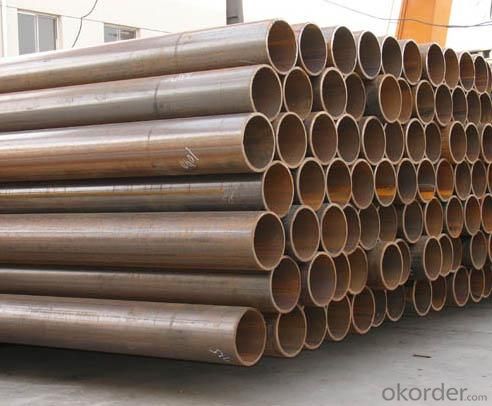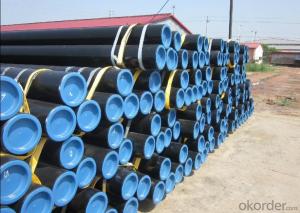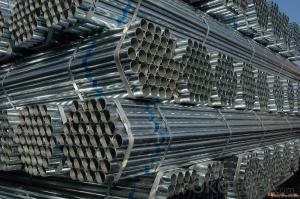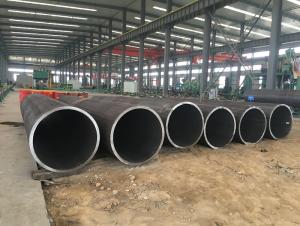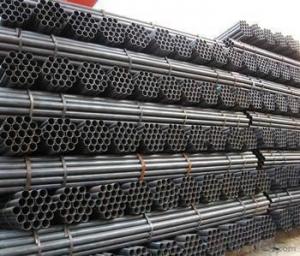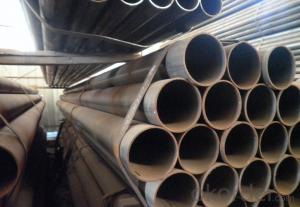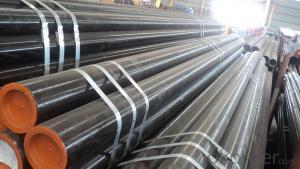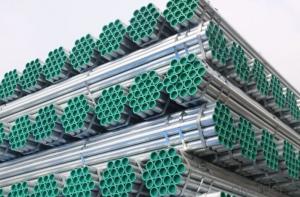Oil Water Gas Transport Welded Oil Steel Pipe
- Loading Port:
- Tianjin
- Payment Terms:
- TT OR LC
- Min Order Qty:
- 30 m.t.
- Supply Capability:
- 8000 m.t./month
OKorder Service Pledge
OKorder Financial Service
You Might Also Like
1、Welded Oil Steel Pipe GB9711.1:
GB9711.1 Oil steel pipe is electric resistance welding, the abbreviation for Oil for transporting oil and natural gas vapor liquid objects, can meet the requirements of high and low pressure, the transport in the world with pipe sector accounted for a pivotal position.
2、Main Features of Welded Black Oil Steel Pipe GB9711.1:
• High manufacturing accuracy
• High strength
• Good visual effect
• Reasonable price
• Small inertia resistance
• Strong heat dissipation ability
3、Welded Black Oil Steel Pipe Specification GB9711.1:
Standard | GB, DIN, ASTM ASTM A106-2006, ASTM A53-2007 |
Grade | 10#-45#, 16Mn 10#, 20#, 45#, 16Mn |
Thickness | 1 - 33 mm |
Section Shape | Round |
Outer Diameter | 21 - 610mm |
Place of Origin | Tianjin, China (Mainland) |
Secondary Or Not | Non-secondary |
Application | Hydraulic Pipe |
Technique | Cold Drawn |
Certification | API |
Surface Treatment | factory state or painted black |
Special Pipe | API Pipe |
Alloy Or Not | Non-alloy |
Length | 5-12M |
Outer Diameter | 21.3-610mm |
Grade | 20#, 45#, Q345, API J55, API K55, API L80, API N80, API P110, A53B |
Standard | ASME, ASTM |
1) Material:20#(ASTM A 106/A53 GRB.API5LGRB,GB),45#,16Mn,10#.
2) Specification range:OD:21.3-610mm,WT:6-70mm,length:6-12m or according to the requirement of clients.
3) Excutive standards:GB,ASME API5L.ASTM A 106/A53,Despite of the above standards,we can also supply seamless steel pipe with standard of DIN,JIS,and so on,and also develop new products according to the requirements of our clients!
4) Surface:black lacquered,varnish coating or galvanized.
5) Ends:Beveled or square cut,plastic capped,painted.
6) Packing:bundles wrapped with strong steel strip,seaworthy packing.
4、Packaging & Delivery
Packaging Details: | seaworthy package,bundles wrapped with strong steel strip |
Delivery Detail: | 15-30days after received 30%TT |
5、FAQ of Welded Black Oil Steel Pipe GB9711.1:
①How is the quality of your products?
Our products are manufactured strictly according to national and internaional standard, and we take a test
on every pipe before delivered out. If you want see our quality certifications and all kinds of testing report, please just ask us for it.
Guaranteed: If products’ quality don’t accord to discription as we give or the promise before you place order, we promise 100% refund.
②How about price?
Yes, we are factory and be able to give you lowest price below market one, and we have a policy that “ for saving time and absolutely honest business attitude, we quote as lowest as possible for any customer, and discount can be given according to quantity”,if you like bargain and factory price is not low enough as you think, just don’t waste your time.Please trust the quotation we would give you, it is professional one.
③Why should you chose us?
Chose happens because of quality, then price, We can give you both.Additionally, we can also offer professional products inquiry, products knowledge train(for agents), smooth goods delivery, exellent customer solution proposals.Our service formula: good quality+good price+good service=customer’s trust
SGS test is available, customer inspection before shipping is welcome, third party inspection is no problem.
6、 Welded Black Oil Steel Pipe Images GB9711.1:
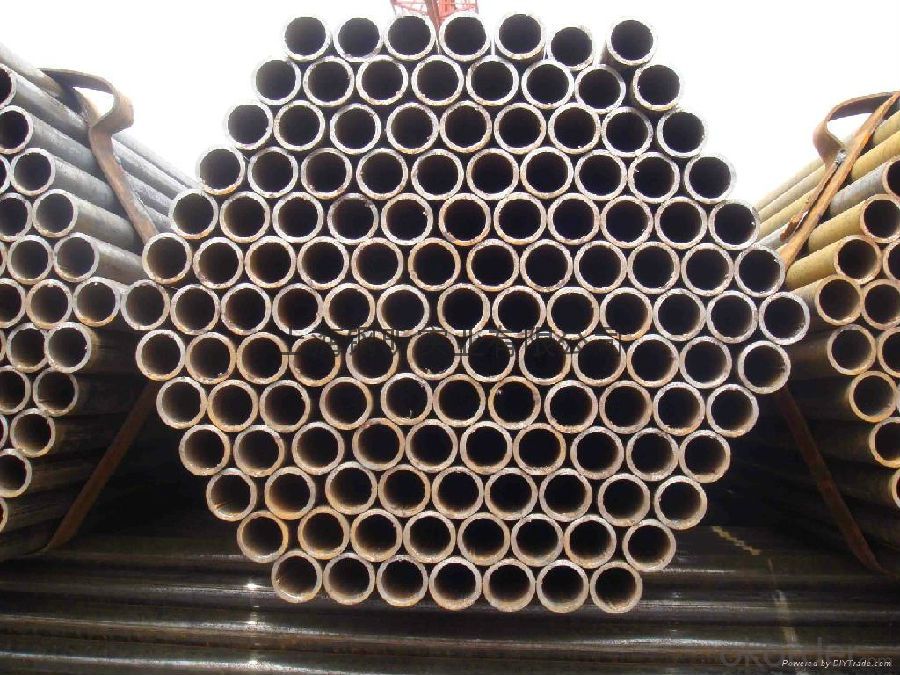
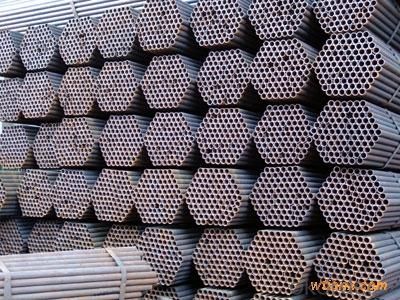
- Q: How can the immersed pipe pile put steel cage into the steel pipe? Which expert to answer?
- Cast-in-place pile for pile machine in place, hammer (vibration), on the edge of immersed tube material, hammer (vibration) side of extubation, and continue pouring concrete, steel cage, continue pouring concrete and extubation to pile.
- Q: Can steel pipes be used for underground sewer systems?
- Yes, steel pipes can be used for underground sewer systems. Steel pipes are strong, durable, and resistant to corrosion, making them suitable for underground applications. However, factors such as the type of soil, water composition, and potential for ground movement should be considered to ensure proper installation and longevity of the sewer system.
- Q: How are steel pipes protected against external corrosion in coastal areas?
- Steel pipes are protected against external corrosion in coastal areas through a combination of coating and cathodic protection measures. One of the most common methods used is the application of a protective coating on the surface of the steel pipe. This coating acts as a barrier between the steel surface and the corrosive elements present in the coastal environment, such as saltwater and humidity. The coating is typically made of materials like epoxy or polyethylene, which are resistant to corrosion and provide a long-lasting protective layer. In addition to coating, cathodic protection is also employed to further safeguard the steel pipes from corrosion. Cathodic protection involves the use of sacrificial anodes or impressed current to prevent the corrosion of the steel. Sacrificial anodes are made of more reactive metals, such as zinc or aluminum, which are attached to the steel pipe. These anodes corrode instead of the steel, sacrificing themselves to protect the steel surface. Impressed current systems, on the other hand, use an external power source to provide a protective current to the steel, preventing corrosion. Regular inspection and maintenance of the protective coating and cathodic protection system are crucial to ensure their effectiveness. Coatings may deteriorate over time due to wear and tear, requiring periodic inspection and reapplication if necessary. Similarly, sacrificial anodes need to be replaced when they are depleted, and impressed current systems require monitoring and adjustment to maintain the desired level of protection. Overall, by combining effective coating techniques with cathodic protection measures, steel pipes in coastal areas can be adequately protected against external corrosion, ensuring their longevity and optimal performance.
- Q: What's the difference between straight steel pipe and seamless steel pipe?
- The welded pipe is made of rolled steel plates, and small ones are straight welded, and big ones are spiral welded. Because the welded pipe has weld, the mechanical performance of weld is poor, so its applicable range is limited, but its price is cheap. Significant difference is that there are welded pipe, seamless steel pipe is not, of course, the welded pipe treatment of good, layman do not see the difference.
- Q: What are the different types of steel pipe coatings for marine applications?
- There are several types of steel pipe coatings used for marine applications, including fusion-bonded epoxy (FBE) coatings, three-layer polyethylene (3LPE) coatings, three-layer polypropylene (3LPP) coatings, and concrete weight coatings (CWC). These coatings provide protection against corrosion, abrasion, and other environmental factors, ensuring the longevity and durability of the steel pipes in marine environments.
- Q: What are the different types of steel pipe joints for underwater applications?
- There are various types of steel pipe joints commonly used for underwater applications, including buttweld joints, socket weld joints, and threaded joints. These joints provide secure connections and maintain the integrity of the pipeline system in underwater environments.
- Q: What's the actual size of the DN25?
- Different materials of steel pipe, nominal diameter of the same, then its outer diameter is the same, diameter = outside diameter -2 times, wall thickness.
- Q: What is the difference between steel pipes and concrete pipes?
- The main difference between steel pipes and concrete pipes lies in their composition and physical properties. Steel pipes are made from a combination of iron and carbon, which makes them strong, durable, and resistant to corrosion. Concrete pipes, on the other hand, are made from a mixture of cement, sand, and aggregates, giving them a solid structure and high compressive strength. In terms of installation, steel pipes are typically lighter and easier to handle, making them more convenient for transportation and installation. Concrete pipes, due to their weight and bulkiness, require heavy machinery or specialized equipment for handling and placement. Additionally, steel pipes have a smooth interior surface, which allows for efficient fluid flow and minimizes friction. Concrete pipes, on the contrary, have a rougher interior surface that can cause friction and impede the flow of fluids. When it comes to cost, steel pipes tend to be more expensive than concrete pipes, primarily due to the higher cost of raw materials and manufacturing processes involved. Both steel and concrete pipes have their specific applications and advantages. Steel pipes are commonly used in industries such as oil and gas, water supply, and construction, where strength and durability are crucial. Concrete pipes are often used in sewer systems, stormwater drainage, and culverts, where their high load-bearing capacity and resistance to chemical erosion make them suitable options.
- Q: Can steel pipes be used for underground water supply pipelines?
- Indeed, underground water supply pipelines can utilize steel pipes. The reason for the widespread use of steel pipes in water supply systems is their ability to endure, their strength, and their resistance to corrosion. They can withstand high levels of pressure and can accommodate large quantities of water. Furthermore, steel pipes come in a variety of sizes and thicknesses, granting flexibility in the design and installation of underground water supply pipelines. However, it is crucial to ensure that the steel pipes are appropriately coated or lined to avert corrosion and uphold the water's quality during transportation. Regular inspections and maintenance must also be carried out to prevent any potential problems with the steel pipes.
- Q: What are the different types of steel pipe unions?
- There are several different types of steel pipe unions, including threaded unions, socket weld unions, and butt weld unions.
Send your message to us
Oil Water Gas Transport Welded Oil Steel Pipe
- Loading Port:
- Tianjin
- Payment Terms:
- TT OR LC
- Min Order Qty:
- 30 m.t.
- Supply Capability:
- 8000 m.t./month
OKorder Service Pledge
OKorder Financial Service
Similar products
Hot products
Hot Searches
Related keywords
